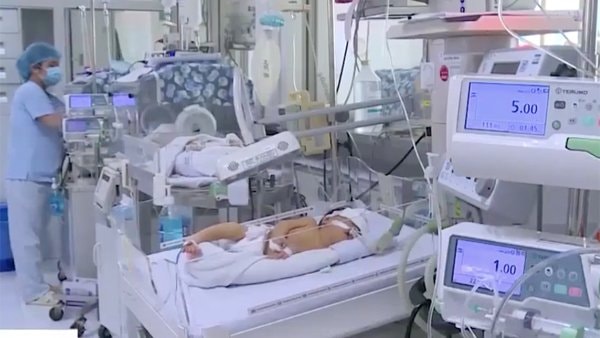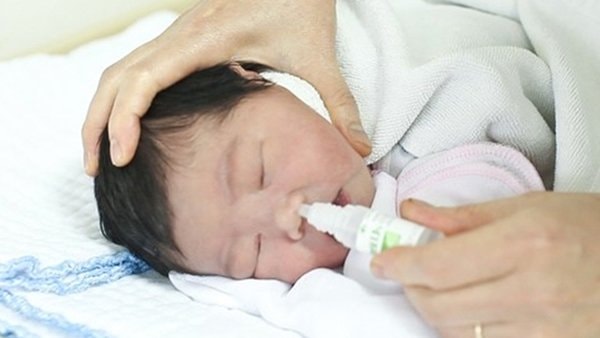Virus easily transmitted through kissing children makes many Vietnamese parents panic
RSV is not a new virus but can be easily transmitted through the respiratory tract, including through adults' habit of kissing children.
RSV virus is not a strange virus
In recent days, many parents have spread information that many children have been admitted to the National Children's Hospital for treatment due to a strange virus with flu-like symptoms for which there is no cure, causing many people to worry.
However, Associate Professor, Dr. Tran Minh Dien, Deputy Director of the National Children's Hospital, confirmed that the virus mentioned above is the respiratory syncytial virus (RSV). This is a common virus in humans, has existed for a long time, and is not a new virus. The hospital is currently treating about 20 children infected with the RSV virus.
RSV virus usually develops strongly in winter - spring, spring - summer, but this year the epidemic appeared unusually early. This virus causes upper respiratory tract disease and bronchitis in infants and young children with the ability to spread strongly, especially in children under 2 years old.
|
| Children infected with RSV virus are treated at the National Children's Hospital. |
According to statistics, up to 90% of children are infected with this virus in the first 2 years of life. In most cases, the infection is mild and does not require medical intervention.
“People should not panic because children with RSV virus can be treated and is completely within the control and expertise of doctors,” Associate Professor Dien said.
Associate Professor Dien said that with the characteristic of residing in the respiratory tract, RSV virus often causes inflammation of the small bronchioles in young children and causes edema and secretion in those bronchioles, causing the child's airways to be blocked.
Easily confused with the flu
When a child is infected with RSV, the initial symptoms are usually sneezing, a runny nose, and possibly a mild to high fever. Because these symptoms are quite common, RSV infection is easily confused with the flu or other viruses.
The disease usually lasts for a few days, in healthy adults the disease is not serious, and in most children it will also go away on its own after 3-5 days.
However, Associate Professor Dien recommends that parents need to base on each child's condition to decide whether to treat the child at home or hospitalize them.
In cases of sneezing, runny nose, wheezing, and mild fever, it is completely possible to leave your child at home, but in severe cases such as wheezing, difficulty breathing, cyanosis, especially in newborns, children under 2 months old, premature babies or those with congenital heart disease, lung disease, blood disease... the child needs to be hospitalized for classification and treatment by a doctor because these children are at high risk of complications.
Currently, major medical facilities can detect RSV virus, and some experienced clinicians can also detect the disease.
|
| When children are infected with mild RSV virus, parents can provide supportive treatment by using nasal drops. |
Regarding the information that there is currently no specific medicine to treat RSV virus, Associate Professor Dien said that is not entirely true. Depending on the condition of the disease, there will be certain interventions. In the early stages, support can be provided by nasal drops, anti-flu, in the later stages, it is necessary to give the child plenty of water, pat the child's back to help the child breathe easier...
Doctors also recommend not using antibiotics in the treatment of acute respiratory infections caused by RSV virus. If parents arbitrarily use antibiotics to treat their children, not only will it be ineffective, but it will also slow down the treatment process.
How to prevent disease
RSV is highly contagious. If families are negligent and do not take their children to the doctor, they will not be able to determine whether their child is infected with a common virus or RSV virus in order to decide on the appropriate medication.
RSV is a respiratory disease, transmitted by direct contact when inhaling droplets from the nose and throat of an infected person. In adults, the disease does not have serious symptoms, but in young children and infants, due to weak immune systems, they are very susceptible to the disease.
In addition, RSV virus is also transmitted through open wound tissues, open surfaces, clothes and toys of sick people or unwashed hands of sick people.
This virus can survive on hard surfaces for more than 6 hours, and on clothes and hands for up to 1 hour. A person infected with the virus may not show symptoms for 2-8 days.
Therefore, the simplest way to prevent the disease is to wash your hands regularly with soap under running water. When wiping your hands, it is recommended to wipe them with disposable paper, not a towel.
When your child is sick, keep a bottle of hand sanitizer in the room for quick hand washing. Also, avoid letting your child come into close contact with people who have the flu or go to crowded areas. Avoid kissing or having close contact with your child when you are unwell.
When coughing or sneezing, adults should cover their mouths with tissues and throw them in a closed bin after use. Parents should pay attention to cleaning surfaces that children frequently come into contact with.



